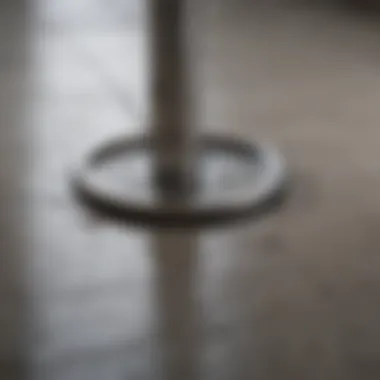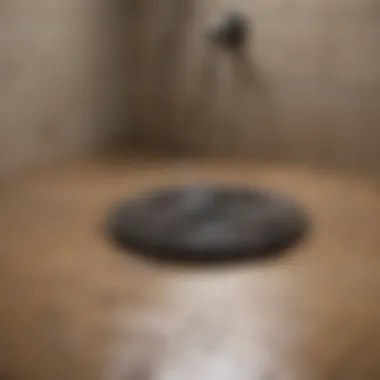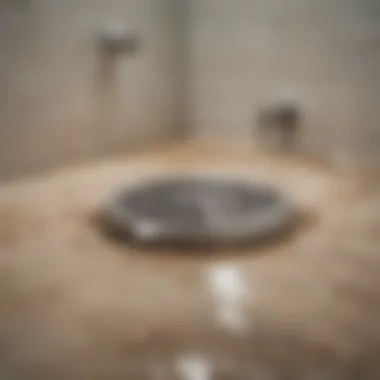Expert Guide: DIY Methods for Unclogging a Shower Drain


Introduction
In this comprehensive guide, we will delve into effective DIY methods for unclogging a stubborn shower drain. From understanding the common causes of clogged drains to implementing step-by-step solutions, homeowners will gain valuable insights on resolving this pesky issue without the need for professional assistance.
Common Causes of Clogged Drains
Before delving into solutions, it is crucial to identify the root causes of clogged shower drains. Factors such as accumulated hair, soap scum, and mineral deposits can gradually obstruct the drain, leading to slow water drainage and potential backups. By recognizing these culprits, individuals can better address the problem at its source.
DIY Solutions for Unclogging a Shower Drain
Natural Drain Cleaners
One eco-friendly approach to unclogging a shower drain involves using a homemade mixture of baking soda, vinegar, and hot water. This gentle yet effective solution can help break down blockages without relying on harsh chemicals, promoting a safer and more sustainable unclogging method.
Drain Snakes and Plungers
For more stubborn blockages, a drain snake or plunger can prove to be indispensable tools. By carefully maneuvering the drain snake or creating a seal with the plunger, individuals can dislodge and remove debris that is impeding the water flow, restoring proper drainage to the shower.
Preventive Measures
To avoid future instances of clogged drains, implementing preventive measures is key. Installing a drain cover can prevent hair and other debris from entering the pipes, while periodically flushing the drain with hot water can help dissolve minor accumulations before they escalate into significant obstructions.
Conclusion
Understanding the Issue
To comprehend the complexity of shower drain clogs is pivotal in this discourse. By delving into the core reasons for these irritations, individuals can grasp the essence of maintenance practices and preventative measures essential for a trouble-free drainage system. Understanding the common culprits behind clogs like hair buildup, soap scum accumulation, and mineral deposits equips readers with the knowledge needed to combat these issues effectively. This section serves as the foundation for the DIY solutions and preventive measures that will follow.
Common Causes of Shower Drain Clogs
Hair Buildup


Hair buildup stands as a prominent contender in the realm of drain obstructions. Through the combination of natural shedding and grooming activities, hair finds its way into drainpipes, forming tangles that impede water flow. This issue is exacerbated in households with multiple individuals or pets. The resilience of hair, its ability to intertwine with other debris, and its capacity to form solid blockages underscore its noteworthiness in clog formation.
Soap Scum Accumulation
The residue left behind by soap, known as soap scum, proves to be a silent adversary to drains. This filmy substance gradually accumulates on pipe walls, narrowing passageways and trapping other particles. The hydrophobic nature of soap scum allows it to stick to surfaces tenaciously, fostering a conducive environment for clogs to develop. While seemingly harmless, its accumulation over time can lead to significant drainage issues.
Mineral Deposits
Mineral deposits, predominantly from hard water sources, pose a different challenge to drain health. Over time, minerals such as calcium and magnesium precipitate out of water, forming stubborn buildups on pipe interiors. These deposits not only constrict water flow but also contribute to corrosion, further exacerbating drainage problems. Understanding the impact of mineral buildup is crucial in implementing targeted solutions to prevent severe blockages.
Signs of a Clogged Drain
Slow Drainage
A clear indication of a potential blockage, slow drainage manifests as water taking longer than usual to empty from the shower. This slowdown signifies an underlying issue within the drainage system that necessitates attention. Ignoring this symptom may exacerbate clogs, leading to more severe plumbing complications. Recognizing the significance of slow drainage prompts timely intervention to prevent further inconvenience.
Unpleasant Odors
Unpleasant odors emanating from the drain signify the presence of stagnant water mixed with decomposing matter. This foul smell not only indicates a hygiene concern but also points to the accumulation of organic material within the pipes. Addressing these odors is crucial not only for a pleasant bathroom environment but also to mitigate potential health risks associated with bacterial growth.
Standing Water in the Shower
The sight of standing water in the shower, even after use, is a telltale sign of drainage issues. It suggests an obstruction significant enough to impede water flow entirely or partially. The accumulation of water not only hampers shower accessibility but also poses risks of leaks and water damage to surrounding areas. Identifying and rectifying standing water occurrences promptly is crucial in maintaining the integrity of the plumbing system and preserving structural integrity.
DIY Solutions
DIY solutions play a crucial role in this article, providing practical and cost-effective methods for unclogging shower drains without the need for professional assistance. As homeowners, having the knowledge and skill to address clogged drains can save time and money. By exploring various do-it-yourself approaches, individuals can effectively tackle the issue at hand while gaining a sense of accomplishment.
Removing Hair Blockages
Using a Drain Snake
Using a drain snake is a specific method discussed in this article to address hair blockages in shower drains. This tool's main advantage lies in its ability to reach deep into the drain and physically remove hair clogs, which are a common cause of drainage issues. Despite its effectiveness, using a drain snake requires patience and precision to avoid causing further damage to the pipes. Its unique feature includes the spiral design that grips onto blockages, allowing users to pull them out efficiently. While highly beneficial for this article, using a drain snake may pose challenges for individuals unfamiliar with plumbing tools.


Homemade Drain Cleaner
The homemade drain cleaner is another DIY solution featured in this article, aimed at addressing hair blockages effectively. This method stands out due to its environmentally friendly nature and simple ingredients that can be found at home. Utilizing a mixture of baking soda and vinegar can help break down hair and other organic matter in the drain, facilitating smoother water flow. Its advantage lies in being gentle on pipes while still powerful enough to dissolve blockages. However, homemade drain cleaners may take longer to show results compared to commercial products.
Clearing Soap Scum
Baking Soda and Vinegar Method
The baking soda and vinegar method is highlighted in this section for its effectiveness in combating soap scum buildup within shower drains. This natural cleaning approach is preferred for its non-toxic properties and minimal environmental impact. The combination of baking soda's abrasive texture and vinegar's acidic nature creates a foaming reaction that breaks down soap residues. This method's advantage is the ability to deodorize the drain while tackling soap scum, promoting overall cleanliness in the shower. Despite its benefits, the baking soda and vinegar method may require multiple applications for stubborn scum.
Boiling Water Flush
Introducing the boiling water flush as a practical solution for clearing soap scum in shower drains. This method relies on the heat from boiling water to melt away greasy residues and flush out any accumulated debris in the pipes. Its key characteristic is the simplicity of the process, requiring only boiling water and a steady hand to pour it down the drain. The boiling water flush is a popular choice for its accessibility and immediate results, making it an efficient option for routine drain maintenance. However, caution must be exercised when handling boiling water to prevent scalding or damage to plastic piping.
Dealing with Mineral Buildup
Vinegar and Baking Soda
Addressing mineral buildup is essential, and the vinegar and baking soda method serves as a valuable strategy in this article. By creating a fizzy reaction, the mixture of vinegar and baking soda can break down mineral deposits that restrict water flow in drains. This natural solution is favored for its ability to dissolve tough buildups without harsh chemicals. Its unique feature lies in being safe for both users and plumbing systems, offering a gentle yet effective approach to mineral buildup. However, repeated applications may be necessary for severe cases of mineral clogs.
Commercial Drain Cleaners
Commercial drain cleaners are discussed as an alternative approach to dealing with mineral buildup in shower drains. These products feature powerful chemical formulas designed to dissolve tough clogs quickly and efficiently. The key characteristic of commercial drain cleaners is their rapid action, providing almost instant relief from mineral buildup. While effective, these cleaners may contain harsh ingredients that can be damaging to pipes and the environment if not used properly. Users must follow safety instructions carefully when employing commercial drain cleaners to avoid accidents or adverse effects.
Preventive Measures
Preventive measures play a crucial role in maintaining a clear and functional shower drain. By taking proactive steps to prevent clogs, homeowners can avoid the hassle and expense of dealing with stubborn blockages. In this article, the focus on preventive measures underscores the importance of regular maintenance to preserve the efficiency of the drainage system. By implementing these strategies, individuals can significantly reduce the likelihood of experiencing a clogged shower drain.
Regular Maintenance Tips
Use a Hair Catcher
In the realm of regular maintenance tips, the use of a hair catcher stands out as one of the most effective preventive tools. This simple yet ingenious device is designed to trap hair before it enters the drain, preventing common clogs caused by hair buildup. The key characteristic of a hair catcher lies in its ability to capture hair and other debris without impeding water flow. Its ease of use and affordable cost make it a practical choice for homeowners looking to maintain a clear shower drain. While some may find cleaning the hair catcher periodically a minor inconvenience, the benefits it offers in preventing blockages far outweigh this minimal effort.


Flush with Hot Water Regularly
Another essential aspect of regular maintenance is the practice of flushing the drain with hot water on a consistent basis. This simple yet effective technique helps to dislodge potential buildup in the pipes, clearing away soap scum, grease, and other residue that can lead to clogs. The key characteristic of flushing with hot water regularly is its ability to maintain the smooth flow of water through the drainage system. This method is particularly beneficial for preventing soap scum accumulation and maintaining proper pipe hygiene. While the process may seem basic, its impact on preventing clogs and ensuring optimal drain performance is undeniable.
Homemade Drain Maintenance
Monthly Vinegar Flush
When it comes to homemade drain maintenance, the monthly vinegar flush emerges as a popular and eco-friendly solution. This method involves pouring a mixture of vinegar and hot water down the drain to break down organic matter and eliminate odors. The key characteristic of the monthly vinegar flush is its natural cleansing properties, which help to dissolve buildup and maintain a fresh-smelling drain. Its non-toxic nature and affordability make it an attractive choice for individuals seeking environmentally friendly maintenance options. While some may find the scent of vinegar off-putting, the benefits of this method in preventing clogs and maintaining drain health make it a worthwhile maintenance practice.
DIY Enzyme Cleaner
Another standout option for homemade drain maintenance is the DIY enzyme cleaner. This natural alternative utilizes enzymes to break down organic matter, effectively clearing minor clogs and preventing future blockages. The key characteristic of DIY enzyme cleaner lies in its enzymatic action, which targets specific types of residue and promotes microbial balance in the pipes. Its biodegradable components and low impact on the environment make it a favored choice among those conscious of eco-friendly cleaning solutions. While the process of creating an enzyme cleaner may require a bit of effort, the long-term benefits of maintaining a clear and odor-free drain make it a valuable addition to any homemade maintenance routine.
Professional Help
In the realm of unclogging shower drains, there comes a point where the assistance of a professional plumber becomes indispensable. While the DIY solutions earlier discussed can work wonders for common clogging issues, certain situations call for expert intervention. Professional help offers a tailored approach to persistent and complex clogs that can be challenging to resolve independently. Plumbers possess specialized tools and knowledge that enable them to diagnose the root cause of the problem swiftly and accurately.
Calling a plumber also provides a guarantee of long-term effectiveness in resolving stubborn clogs. DIY methods might offer temporary relief, but a professional plumber's intervention ensures a thorough and lasting solution, preventing future recurrences. As such, it is essential to recognize when the expertise of a plumber is necessary to address severe clogging issues effectively.
Aside from expertise, plumbers bring efficiency to the table. Their experience equips them to tackle clogs with precision and speed, minimizing disruption to daily routines. By entrusting the clog removal to a professional, homeowners can rest assured that the job will be done thoroughly and efficiently, saving time and effort in the long run. Moreover, professional help grants access to advanced equipment and techniques that may not be readily available for DIY use, ensuring a comprehensive and meticulous approach to unclogging shower drains.
When to Call a Plumber
Persistent Clogs
Persistent clogs pose a significant challenge in maintaining optimal drainage in shower systems. These clogs stubbornly resist conventional DIY methods, indicating a deeper underlying issue that requires professional assessment. The persistence of these clogs often stems from complex blockages or structural issues within the plumbing system.
Plumbers excel in dealing with persistent clogs by conducting thorough inspections to identify the specific cause. Through advanced diagnostic tools and expertise, they can pinpoint hidden blockages or damages that contribute to ongoing clogging issues. This detailed approach ensures that the clog is not just alleviated temporarily but completely eradicated, restoring the shower's functionality to its full capacity.
The advantage of seeking professional help for persistent clogs lies in the tailored solutions provided. Plumbers utilize a range of techniques, such as hydro-jetting or pipe relining, to address the root cause effectively. These specialized methods target the clog at its source, offering a comprehensive solution that extends the longevity of the plumbing system. While DIY attempts may provide temporary relief, professional intervention is crucial for eradicating persistent clogs once and for all.
Foul Smells Despite Cleaning Efforts
Foul odors emanating from the shower despite regular cleaning indicate a deeper issue that necessitates professional attention. These persistent odors often result from bacteria buildup or mold formation within the plumbing system, requiring specialized treatment for eradication. The presence of foul smells despite consistent cleaning signifies a hidden problem that demands expert intervention.
Professional plumbers excel in addressing foul smells through comprehensive inspection and tailored solutions. By identifying the source of the odor, whether it be bacterial growth or trapped debris, plumbers can implement precise measures to eliminate the underlying cause. Their expertise in dealing with plumbing-related odors ensures that the issue is not merely masked but fully resolved, restoring a fresh and hygienic environment to the shower.
Engaging professional help for foul smells offers a proactive approach to ensuring the cleanliness and functionality of the shower system. Plumbers utilize specialized equipment and treatments to target the specific cause of the odors, providing a long-term solution that promotes a healthy indoor environment. While DIY deodorizing methods may offer temporary relief, the thoroughness of professional odor removal ensures sustained freshness and comfort within the shower area.



